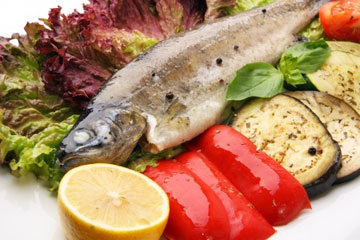Nutrition of athletes in cancer
 A balanced diet that is as nutritious as possible and that is largely free of potentially harmful ingredients can not only help you achieve top athletic performance, but also demonstrably protect against serious illnesses. In addition, it can help to overcome even the most serious illnesses, such as life-threatening cancer. As a result, at the latest those athletes who are suffering from cancer despite their healthy lifestyle should pay more attention to their diet than before.
A balanced diet that is as nutritious as possible and that is largely free of potentially harmful ingredients can not only help you achieve top athletic performance, but also demonstrably protect against serious illnesses. In addition, it can help to overcome even the most serious illnesses, such as life-threatening cancer. As a result, at the latest those athletes who are suffering from cancer despite their healthy lifestyle should pay more attention to their diet than before.
It's never too late to change your eating habits!
Most people underestimate the immense role that diet plays in the development, progression and healing of cancer. This in turn means that hardly any patient seriously believes that a change in diet can significantly improve their chances of recovery. It should be well known by now that a large part of our food is contaminated with poisons that definitely favor the development of cancer and thus also worsen the prospects of a cure. For example, fertilizers, pesticides, fungicides and herbicides that land directly on our plates from the field. In addition, many ready meals and so-called fast food mostly contain additives that are at least suspected of significantly increasing the risk of cancer. For these reasons alone, it would make more than sense to change your diet even after a cancer diagnosis and from now on mainly eat fresh organic products without questionable ingredients.
In addition to the potentially dangerous foods, there are also many foods that are not only healthy, but also have an anti-carcinogenic effect. For example berries, which are beneficial to general health due to their extremely high vitamin content. In addition, dark berries in particular also contain plant pigments called anthocyanins, which have an antioxidant effect. Berries are also rich in so-called bioflavonoids, which are secondary plant substances with a health-promoting effect. Ellagic acid, which is found in blackberries, strawberries and raspberries, also has an antioxidant effect. It also has an antimicrobial and antibacterial effect. Furthermore, it can even render carcinogenic substances and dangerous cell toxins such as acrylamide and aflatoxin harmless. Furthermore, ellagic acid should counteract the development of new cancer cells, accelerate the death of already diseased cells and at the same time protect healthy cells.
Other anti-carcinogenic foods are, for example, so-called cruciferous plants, such as white cabbage, kale, Brussels sprouts, Chinese cabbage and broccoli as well as turnips, radishes, white beets and radishes or mustard and watercress, all of which contain incredibly important clucosinolates (mustard oils), which thanks to a variety of antioxidant ingredients can significantly help against cancer. The cabbage varieties mentioned are by no means the only leafy vegetables that have proven themselves in cancer prevention and cancer therapy. In addition, spinach, lamb's lettuce, dandelion and rocket as well as savoy chard and the like should be mentioned, as these and the many other green leafy vegetables are rich in many important nutrients, vital substances and bitter substances and healthy chlorophyll, which strengthens the immune system as well as detoxify the body and thereby protect it from cancer. Of course, this also makes it more difficult for existing cancer to spread further in the body. In fact, to put it bluntly, they even actively intervene in the fight against cancer. Other highly effective “miracle cures” from the grocery shelf include green tea, tomatoes, turmeric and fresh garlic. There is also so-called vital mushroom, which has been said to have beneficial effects in Chinese medicine for centuries.
The importance of dietary supplements
Many cancer patients suffer from a clouding of taste, loss of appetite, nausea and the associated reluctance to eat, due to their illness or due to the therapy. Impending consequences are unwanted weight loss and, in the worst case, even a dangerous nutritional deficiency, which it is essential to avoid in connection with cancer. Dietary supplements, such as the so-called drinking food from Fortimel, promise a remedy for these unpleasant consequences Gaining weight with cancer, which are available in many different flavors, or the typical supplements for athletes that provide the body with all the nutrients it urgently needs.




